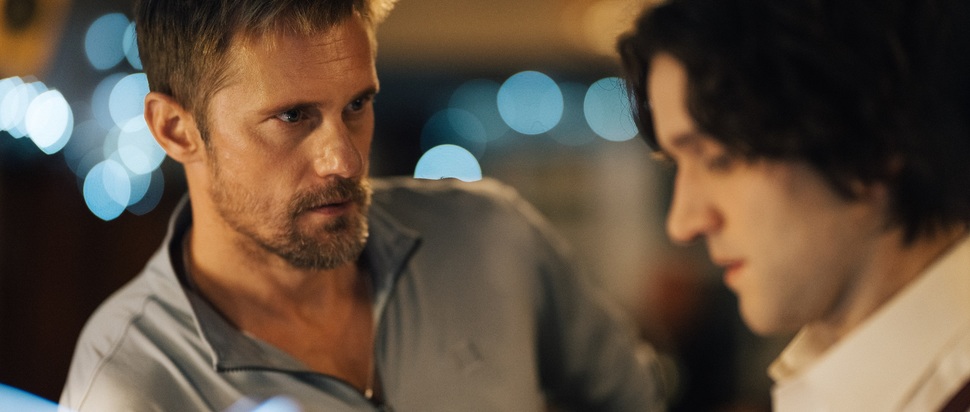Feels on Wheels: Harry Lighton on Pillion
Pillion dives into the sub-dom relationship between a meek traffic warden (Harry Melling) and a hunky biker (Alexander Skarsgård). Writer-director Harry Lighton tells us more about his funny, horny, tender and thoughtful debut feature
What’s the strangest first date you’ve ever been on? How about meeting a man you’ve exchanged no more than a few words with on Christmas Day, following him into an alley, kneeling down by the bins and giving him a blowjob before licking his boots? This is how the relationship begins between introverted traffic warden Colin (Harry Melling) and the taciturn, Adonis-like biker Ray (Alexander Skarsgård) in Pillion. The pair slip quickly into a submissive-dominant relationship, although it’s clear that the naïvely romantic Colin yearns for much more intimacy than Ray is willing to give.
Pillion is the feature debut from writer-director Harry Lighton, who was immediately captivated by Adam Mars-Jones’s novel Box Hill when producer Eva Yates sent it to him. “I read it and I was really intrigued by the tone of it, that was the thing that got me,” he said. “I was like, ‘Oh, this has made me laugh, but it's also made me horny and it's made me think,’ and those three things are interesting combinations to try and play with.” Lighton juggles these tones throughout his liberal adaptation, which creates a series of erotically charged, awkward, painful, funny and tender encounters between its two perfectly cast leads.
These encounters hinge on outré sexual activities, from a bout of living-room wrestling to an al fresco orgy with a gang of leather-clad bikers, and Lighton saw each sub-dom setpiece as integral to the film’s structure. “For me, those scenes are the most interesting to write because you know that dialogue isn't going to be the catalyst to changes in action or in their dynamic,” he says. “Trying to think of ways in which sexual manoeuvres or sexual shifts in status can create a shift in a character's mood or tell the audience something about that character, I found that fascinating.”
Lighton worked with intimacy coordinator Robbie Taylor Hunt to help the actors choreograph these scenes while maintaining a crucial sense of authenticity. “My biggest thing with sex scenes generally is that they don’t feel like sex scenes, they feel like gestures towards sex,” he says. “I told Robbie and the actors that we needed to avoid that kind of symbolism of sex and just get the clumsy reality. Robbie's great at that, because the way he works, it's very much not the ‘Right, move your knee here, four thrusts’ kind of work. It's more like, let's map out the sex scene and then give the actors cues where they can trigger a shift in it.” While some people across the industry have been dismissive of the need for intimacy coordinators, Lighton now sees them as valuable collaborators. “It's an evolving art, isn't it, in terms of coordination. When I first started working with them, it was more prescriptive and felt a little bit inhibiting, whereas now I don't find it at all inhibiting.”
As Pillion progresses, Colin’s relationship with Ray gets into some increasingly uncomfortable territory. The pair assume their sub-dom roles with little discussion of boundaries or comfort levels, and Colin’s infatuation with Ray threatens to override his awareness of where to draw the line and how much degradation he's willing to accept. Colin’s slowly dawning sense of his own desires and his own dignity gives the film its narrative arc, and Lighton was keen to cultivate some ambiguity and tension around the character’s journey.
“It would be clear to anyone from the community, but it should be clear to everyone who watches the film that this is not meant to be a model BDSM relationship at all. Ray is not a good dom. There’s no protocol established, there are none of the usual ways of safeguarding these relationships, and that's why I wanted to contrast Ray and Colin's relationship with some of the other biker-pillion pairs,” he explains. “I didn't want it to seem like I was offering up a blueprint for a relationship, and I want that question of whether Colin is being liberated or being abused by this to be a live question for the audience.”
Lighton has already enjoyed plenty of success with Pillion, receiving the Best Screenplay Award in Un Certain Regard at Cannes and winning a Chanel/BFI Filmmaker Award the day before our interview, but he’s now focusing on future projects. Whatever he makes next, Lighton is determined to recapture the spirit that carried him through his debut. “I've been lucky, because I was always told that producer-director relationships don't survive the first feature, and I'm still very good friends with both of my producers,” he says. “I had a very young, eager, hungry team around me, and I'll hopefully continue to work with a lot of them. If I get to make more films, I want to try as hard as I can to engender that same feeling of, ‘We really want to make this great, and we all have stakes in it being good,’ because it was such a fun set to be on.”
Pillion is released 28 Nov by Picturehouse Entertainment
For more on Pillion, listen to the latest episode of The Cineskinny podcast on Spotify, Apple Podcasts, YouTube, or wherever you get your podcasts
